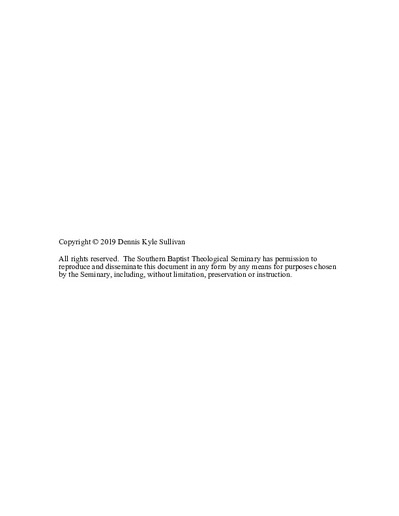Examining the Ecclesiological Soundness of the Southern Baptist Multisite Church Movement
Abstract
ABSTRACT
EXAMINING THE ECCLESIOLOGICAL SOUNDNESS OF THE SOUTHERN BAPTIST MULTISITE CHURCH MOVEMENT
Dennis Kyle Sullivan, PhD
The Southern Baptist Theological Seminary, 2019
Chair: Dr. Timothy K. Beougher
This dissertation evaluates the ecclesiological soundness of the multisite church movement (MCM). A multisite church defines itself as one church meeting in multiple locations. Despite pure evangelistic motivations, the multisite church model is inconsistent with biblical ecclesiology and with traditional Baptist ecclesiology as reflected in widely influential Baptist confessions of faith and in key theological writings by influential Baptist theologians.
Chapter 1 details the multisite church’s rise to prominence in American Evangelicalism and its projected longevity. This introduction also presents the problem of Baptist multisite churches who operate outside of their stated convictions by participating in the MCM. Finally, the thesis, background, and research methodology are presented.
Chapter 2 addresses the MCM from a historical perspective. This chapter argues that the multisite church is a unique expression of the church that is unprecedented in church history. This chapter considers the New Testament, the ante-Nicene episcopacy, early American Methodism, and early Baptist life in America as potential roots of the MCM. The chapter then concludes that, although it is unique, the multisite church most closely parallels the ante-Nicene episcopacy.
Chapter 3 argues that the meaning of ekklesia requires that a church assemble in order to be a church. Only limited attention is devoted to this issue since it has surfaced repeatedly in multisite literature. This chapter considers the meaning of ekklesia in order to uniquely build upon it in the following three chapters.
Chapters 4 through 6 are the primary and unique contributions of this dissertation. They show that the significance of the local church assembly is evident in more than the meaning of ekklesia. Churches must assemble in order to govern, discipline, and observe the Lord’s Supper in a way that is consistent with New Testament ecclesiology and Baptist tradition.
Chapter 7 concludes the dissertation by summarizing the arguments from chapters 2 through 6. Baptist churches are cautioned to proceed with trepidation as they consider their involvement in the MCM. Parameters by which a multisite church can remain within the boundaries of New Testament and Baptist ecclesiology are given. Finally, suggestions for further research on the MCM are made.

